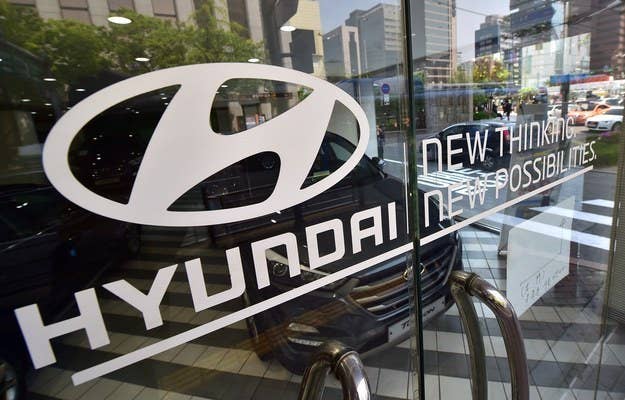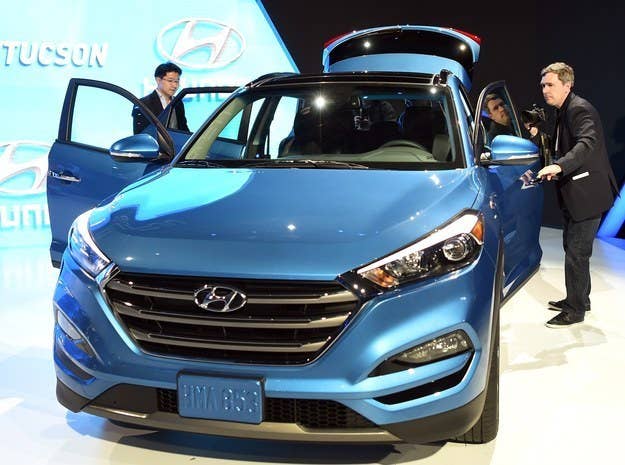
Workers at a car parts factory in Selma, Alabama, evacuated their plant last week after a chemical monitor alarm went off, according Letasha Irby, 36, an employee there. Irby worked for nine years on the production line, making $12 an hour manufacturing foam seat cushions and headrests for Hyundai cars, and experienced many such evacuations.
But this time she watched it from a separate facility across the road, where she works checking labels on parts bins. Irby says Lear Corporation, which operates the factory and is a major Hyundai supplier, moved her to warehouse duty after she started speaking out publicly about health and safety issues at the facility last year.
On Thursday, the United Auto Workers union, which has been running a union drive at the Selma factory, plans to deliver a petition with more than 25,000 signatures to Hyundai dealerships in more than 20 states and the corporate headquarters in Fountain Valley, California, calling on the South Korean company to demand its supplier protect its workers against exposure to unsafe chemicals on the job.
Hyundai said in a statement that "the health and safety of workers associated with the manufacturing of Hyundai vehicles is paramount," and that the company's contracts with suppliers "require them to be in full compliance with all applicable laws and regulations."
The UAW action comes after decades of wage cuts in the auto industry, where much of the manufacturing base has shifted to non-union operations in the South. While manufacturing jobs were once tickets to the middle class, many are now closer to low-wage jobs at McDonald's or Walmart, in both pay and precarity. One in four auto parts workers make less than $12.63 an hour, according to a recent report by the National Employment Law Project, and 600,000 manufacturing workers make $9.60 or less per hour — comparable to workers in fast food and retail.
Low pay isn't the only parallel between fast food and the auto industry: Contracting creates an insulating layer between employees and the big companies. About 14% of auto parts workers are employed by staffing agencies, not the factories they are working in, the NELP report found. Those agencies pay lower wages that are typically not included in official industry-specific wage data. Estimates based on U.S. census data indicate that agency-contracted workers make 30% less, on average, than direct employees.
These multiple layers between factory workers and car companies also mean accountability for health and safety issues often takes place far from the public eye, with little-known second- and third-tier employers held responsible.
"The best thing to do is to get the auto companies on the hook for their violations, since it is technically their business," said Cathy Rucklehaus, a workplace standards enforcement expert with the National Employment Law Project. "You can't have a car without a seat. You could also be responsible for the workers that are providing those products."
Since Hyundai dictates that contracted suppliers make a certain kind of foam seat that requires employees to work with hazardous chemicals, Rucklehaus said, they could potentially be found jointly responsible as an employer for health and safety violations. Historically, auto industry unions would deal with health, safety, wages, and other workplace conditions at plants, she said, so there isn't a lot of precedent for these kinds of legal cases.
"You don't have auto cases very often because unions were there, and workers had pretty good wages," said Rucklehaus.

Over the past five years, 24 suppliers of Hyundai Motor Company in Montgomery, Alabama, have been cited for health and safety violations. Of the 79 violations, 46 were classified as "serious," meaning they were hazards that could "cause an accident or illness that would most likely result in death or serious physical harm, unless the employer did not know or could not have known of the violation," according to the Occupational Safety and Health Administration (OSHA).
In May, OSHA sent a "hazard alert" letter to Lear Corp., calling on the company to take "necessary" steps to protect its Selma workforce from exposure to TDI, or toluene diisocyanate, a chemical used in the production of car parts that has been linked to asthma and cancer.
A Hyundai spokesperson said its supplier agreement with Lear Corp. is technically with Lear's plant in Hope Hull, Alabama, which "would suggest this petition/action/rally/campaign is misdirected." In Hyundai's supply chain, Lear Corp. first makes the cushions and headrests for car seats in Selma, which are then assembled into more finished parts at other Lear Corp. locations.
The letter from OSHA details recurring air contamination at the Selma plant, including an instance where Lear Corp.'s monitors detected TDI levels in the air more than 18 times the federal permissible limit.
OSHA wrote that "reports of workers and management concerning spills, leaks and alarms" strongly suggest "employees are periodically exposed to elevated TDI at the facility," and, further, that OSHA investigators identified employees "who suffered from symptoms and medical conditions consistent with isocyanate-induced asthma."
In a response letter to OSHA dated June 1, Lear Corp. stated no Selma employee has filed a workers' compensation claim or received workers' comp benefits for isocyanate-induced asthma. Lear Corp. also stated that data recorded during OSHA inspections showed "our plant's atmosphere falls within lawful limits" as well as within "limits scientifically recognized as hazardous in the industry."
While recordings taken during visits by OSHA inspectors were within legal limits, the regulator cited readings recorded at other times by Lear Corp.'s own internal monitors. According to the letter, even brief exposure to TDI, below current OSHA limits and industry standards, could lead to asthma and other respiratory conditions. Peter Dooley, a consultant for the National Council for Health and Safety and adviser to OSHA, told BuzzFeed News that if monitoring devices indicate a level of exposure that calls for evacuation, "that is a health and safety disaster right now."
A spokesperson for Lear Corp. told BuzzFeed News that as a precaution, the company evacuates the factory every time a chemical monitor goes off, and that various factors can set off the alarms, including dust, dirt, and malfunction. They said Irby was moved from the factory line to the warehouse "so she would be more comfortable," because she continues to allege that the factory air is unsafe.
While OSHA can and does impose penalties for violations — a total of $284,504 for the 79 listed above, reduced to $156,763 after the companies appealed and provided additional documentation — Dooley says the amounts are not typically enough to incentivize companies to change their practices, and internal monitoring by workers and employers is more effective.
"We know that organized workers have more health and safety oversight," he said. "If an OSHA investigator were to go to every work site, it would take more than a hundred years."
In April, an Alabama federal judge issued a restraining order against Lear Corp. after the Labor Department accused the company of illegally harassing another worker who had spoken out about health and safety and of obstructing a federal OSHA investigation.
Irby said that Lear Corp. has told workers that the OSHA investigation could be bad for business and that the union is acting in self-interest in Selma.
"They say the union will take our money," she said. "They can't take what we don't have."



